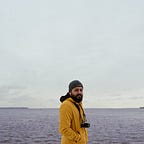Inside a refugee camp between Serbia and Hungary
I distinctly remember Peter offering me a cigarette as we left his car. It was cold that day, I was depply concerned for our safety. I fretted that the risks we were running were too high.
I really feared that this could be my end.
I took his cigarette, despite the fact I am not a smoker, for two reasons: to stop feeling so cold out of the car and to feel safer. There is something that psychologists can explain about holding a cigarette or a cup in an situation of anxiety. One definitely feels more confident while holding something in an attempt to pretend to know what they are doing.
I lit up the cigarette and walked calmly alongside Peter on our way across the road we were at. From that point on, I could get a clearer view of the place we were about to enter. Illegally.
It was a transit zone to refugees on the border between Horgos (Serbia) and Röszke (Hungary). I had found Peter on Facebook, he was part of a specific group that helps refugees in Hungary when I was searching for potential contacts and partners for my project. I did not know him personally up until that verymoment but for some unexplained reason he ended up agreeing on taking me from Hungary to Serbia for free in his own car.
It is strictly forbidden by the local authorities of both countries to enter a refugee transit zone, but every humanitarian organization turn a blind eye to that rule anyway.
I suddenly caught myself staring back to Peter’s car in a last-ditch attempt of memorizing anything that might be useful. I left my backpack inside it, but all important items were still with me. Especially the passport containing a serbian authoritie’s stamp, the unexpected visa I had just got.
A few moments earlier while we were trying to make the crossing by car, Peter asked me if I had the serbian visa. Of course I did not. He grew a little bit more concerned but I told him that Brazilian passports tend to be well accepted almost anywhere. And, sure enough, the Serbian agent did not bother us and we were able to cross the border. We had to lie to him, saying that we were going to buy cigarettes and beer in Serbia (those are usually cheapier there) and that we were coming back before the sunset (at least this part was true).
When we got into the refugee camp it was particularly noticeable how agressive the barbed-wire fence were. It has been clearly as a reminder that refugees were unwelcome here.
There was a gentle but still very cold breeze was blowing on the camp, enough to make me wonder how cold it might be during the night. I asked Peter how they managed to remain warm during the night. He told me that people were fighting for a space in the chemical toilet. Literally, people were fighting against each other to sleep at the very same place they urinated and defecated.
Shit.
That is what I am in this moment. A singular, warm and solid piece of shit.
I looked around the whole camp and I could not feel more sorry for those people: barefoot children coming out from their tents, distrustful skinny men and women kept staring at us trying to decipher us: were we good or evil?
Something made them think we were not a threat. They let their children come to us and Peter did not disappoint them: he took dozens of chocolate bars and tradiant smiles spread all over their faces. That was when I noticed I had everyone’s agreement to take pictures of them.
Peter had told me Serbians could approach us and I should be fast: I would have to take out the memory card from the camera, manage to hide it in my clothes and replace it with another one.
If they steal me, they will take an useless empty memory card.
I kept an eye out for any possible unexpected movement around me. That inner tension I was feeling when I left the car was gradually transformed into a state of mindfullness. I felt confidence enough to handle my camera on manual mode (photojournalists usually turn on the automatic or speed priority mode). I was able to interact with children, talk to their parents and register some details of the camp such as their tents and donation clothes. Some of those had not been picked up yet.
“We are not alone”
I spotted some people arriving from the opposite side of the place from where we came in. Peter’s eyes me mine. I knew what I had to do. Gradually I turned my body in the opposite direction of those guys, opened the memory card slot, pulled it out with the pictures I had just shot and put another one in. It was empty, so I slowly turned back to the camp direction and got a few random shots.
Peter and I started to walk away from the camp. It was almost 5PM and I had all pictures I needed. We did not run,instead, we strode.
They did not run to reach us and I do not know why.
We headed back for Peter’s car. He started the engine and in a few moments it was warm again. I got the memory card back and I was firmly holding it as an olympic athlete chenches their hand around a gold medal. A trace of smile played across my lips, I only know this because Peter asked me why I was smiling.
I feared that this day could be my end. I am glad that I was right.
